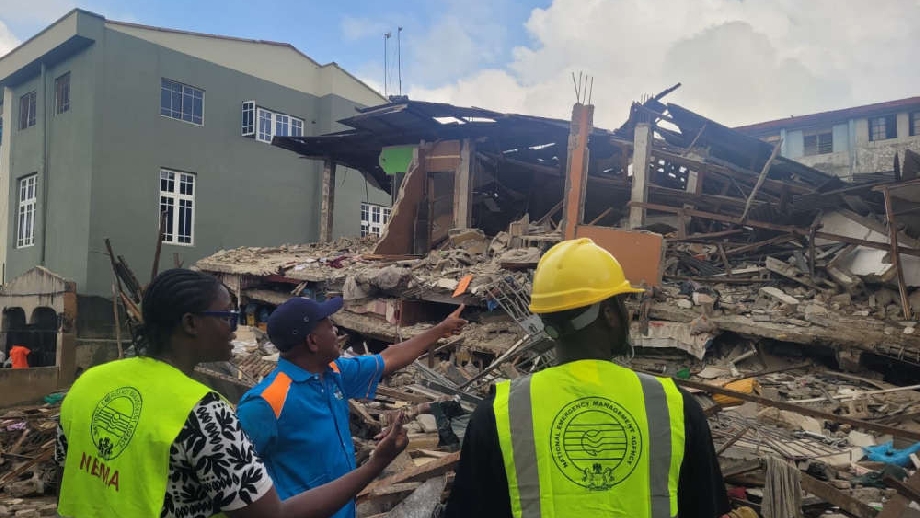
On Thursday, October 31, a building in Ajegunle, Apapa, Lagos, collapsed while being demolished, killing one and injuring several others.
A few days earlier, on Monday, October 27, a two-storey building collapsed in Oyingbo, Lagos, killing two and injuring several others.
Two incidents in one week; incidents that Nigerians have come to expect, while hoping against; incidents that have centred fear in the citizenry.
It began in 1974 when a multi-storey building in Oyo State gave way, killing 27 people. That tragedy would become the first officially documented building collapse in Nigeria, and sadly, not the last.
Fifty years later, the country is still counting the cost of negligence and weak enforcement, with 679 recorded collapses and over 1,639 deaths, according to data from the Building Collapse Prevention Guild (BCPG).
Those numbers tell a story of half a century of preventable loss — of homes, livelihoods, and lives — in a country still struggling to build safely.
The 1974 Oyo tragedy marked the beginning of Nigeria’s record-keeping on collapses, and since then, what once seemed like isolated accidents have become disturbingly frequent events.
National Trends and Distribution
The BCPG data paints a grim national picture. Since that first recorded incident, Nigeria has averaged 17 collapses a year, claiming more than 30 lives annually. The disasters cut across public and private structures — from high-rises to bungalows — and expose deep flaws in the nation’s construction culture.
Lagos stands out as the epicentre. The state alone accounts for 53.9% of all building collapses in Nigeria since 1974 which is comfortably more than half of the total.
This, experts say, is unsurprising given Lagos’s population density and rapid urban expansion. Still, it points to a troubling pattern of oversight and regulatory failure.
The remaining 46.1% of incidents are scattered across other states, with the Federal Capital Territory (Abuja) and states like Anambra, Oyo, and Kano recording about 3–4% each.
On the lower end, states such as Zamfara, Taraba, Yobe, Bayelsa, Sokoto, Gombe, Katsina, and Kebbi have each reported just one collapse since records began.
The rarity of incidents in these states offers little comfort, however, because of the poor building standards and poor maintenance culture across board.
 The Climb in Casualties
The Climb in Casualties
While building collapses once seemed infrequent, the annual toll has climbed sharply in recent years.
2022 was the worst year on record, with 62 collapse incidents nationwide, 20 of them in Lagos. That same year saw the first-ever collapses recorded in Taraba, Bayelsa, Gombe, and Yobe.
The following years were hardly better — 52 collapses in 2023 (17 in Lagos) and 47 in 2024 (13 in Lagos).
As of October 2025, Nigeria has already witnessed 37 collapses, suggesting the country is far from reversing the trend.
Lagos State: The Epicenter
Home to more than 18 million people, Lagos is Nigeria’s economic capital and its de-facto ground zero for collapsing buildings. Between 2011 and 2025, the state recorded 171 collapses.
Its skyline, crowded and chaotic, hides a dangerous truth: that far too many of its structures are ticking time bombs.
One of the most devastating examples remains the 20-storey building collapse on Gerrard Road, Ikoyi, in November 2021 — the tallest building ever to fall in Nigeria.
The tragedy killed 52 people and injured 15, sparking national outrage. Investigators said the disaster exposed “a culture of cutting corners”, where professional standards were ignored, and building regulations weakly enforced.
Since that collapse, Nigeria has witnessed 206 more building failures, with 64 occurring in Lagos alone, claiming 273 additional lives nationwide, 83 of which were lost in Lagos.
In just four years, the country’s construction crisis has grown steeper and deadlier.
Causes and Systemic Issues
Experts agree that building failures everywhere in the world stem from two key issues: poor maintenance and weak enforcement of standards. Nigeria’s problem is not a lack of technical guidelines but the failure to enforce them.
Site inspections often reveal alarming shortcuts, like the use of substandard materials to the hiring of unqualified labourers masquerading as professionals.
Unlicensed builders frequently use inferior cement, low-grade steel, and weak concrete blocks, all in a bid to save costs.
The pioneer national president of the Building Collapse Prevention Guild (BCPG), who is also the Past National President, Nigerian Institute of Building (NIOB), Kunle Awobudu, revealed this as the chief method employed by many builders, especially in Lagos.
“When [developers] see that a building is well-located, they will approach the family to [to strike a deal],” Awobudu said.
“Then they will demolish the building on the land to develop storey buildings.
"In the process, these people might have challenges, and begin to manage [materials] to complete the building.”
Meanwhile, oversight agencies, plagued by underfunding and bureaucracy, struggle to keep up. The result is structures that crumble in a matter of years when they should be standing for decades.
The Human Cost and the Way Forward
Each collapse tells a personal story — of workers buried in rubble, of families made homeless, of dreams literally reduced to dust. Yet the tragedies keep repeating themselves, suggesting that lessons are not being learned fast enough.
Nigeria’s housing crisis continues to worsen as urbanization surges. With millions still in need of affordable housing, the temptation to cut corners grows.
Experts warn that unless government agencies enforce stricter professional standards, and builders are held accountable, these statistics will keep rising — one preventable disaster at a time.
In the end, the story of building collapses in Nigeria is not just about failing walls — it is about failing systems, failing oversight, and the loss of public trust.
Unless decisive action is taken, more Nigerian families may find themselves mourning not just the collapse of concrete, but the collapse of confidence in a nation’s ability to build safely.


